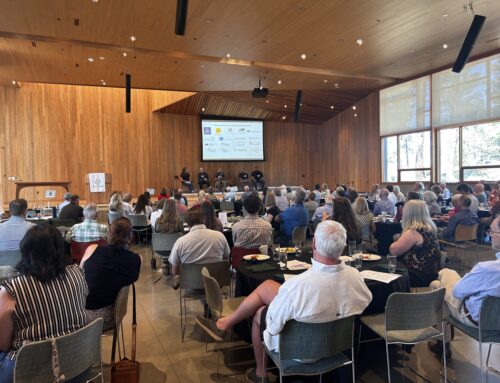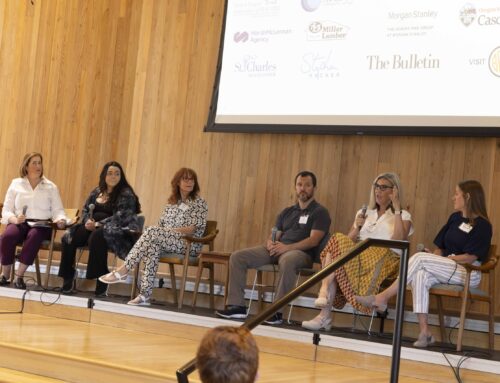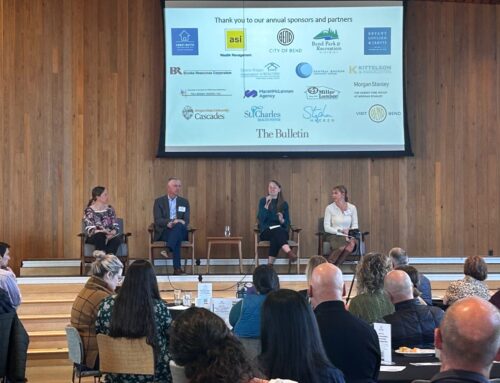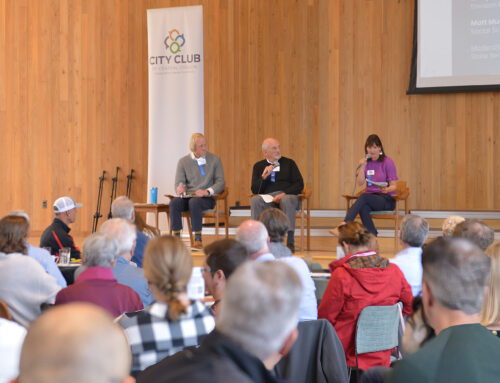August 17, 2023
In today’s rapidly evolving educational landscape, the City Club of Central Oregon’s recent event, “(Mis)Behavior in the Classroom: Carrot, Stick, or…?” sheds light on the critical challenges surrounding student behavior and discipline policies. As shifts in student conduct impact both learners and educators, the event addressed vital questions about how schools, families, and communities can collaboratively address behavioral issues while upholding fairness and efficacy.
The classroom has always been a microcosm of society, where young minds learn not only academic lessons but also critical life skills, including social interactions, empathy, and problem-solving. However, as societal norms transform, so too does student behavior. Changes in family structures, technology’s omnipresence, post-pandemic social issues, and shifting cultural paradigms have all contributed to the evolving landscape of behavior within schools.
The panelists emphasized the terms “Regulated” vs. “Unregulated” when speaking to behavioral issues. The key factor is helping children learn how to regulate and bounce back from emotions and stressors. Emotional intelligence is something not everyone learns from home, so how can our schools step in to help students navigate complex feelings? How can we as a community model and mentor students to learn these life skills?
The event’s panelists, coming from diverse fields, offered a comprehensive understanding of the issue. Eric Powell, Assistant Director of Student Services at Bend-La Pine Schools, shared his on-ground experience in dealing with behavioral challenges. Lucy Purgason, Assistant Professor of Counseling at OSU Cascades, offered insights into the psychological aspects underlying these behaviors. Sonya Littledeer-Evans, Deputy Director of Juvenile Community Justice for Deschutes County, provided a broader perspective on the community-wide implications of student discipline.
Central to the discussion is the question of response—how teachers, counselors, students, and parents should collectively address behavioral concerns. The traditional approach of wielding the proverbial “carrot and stick” to reward positive behavior and penalize misconduct has faced criticism in recent years. Research suggests that punitive measures often fail to address the root causes of misbehavior, potentially exacerbating the issue rather than resolving it. Instead, educators are exploring more holistic methods that consider the underlying triggers of disruptive conduct.
This transition towards a more empathetic approach to discipline aligns with the growing emphasis on local control in education. This flexibility also highlights the need for comprehensive guidelines to ensure a consistent and equitable response across schools and student backgrounds.
One of the most pressing concerns is the disproportionate impact of discipline policies on students of color and those with disabilities. City Club of Central Oregon’s recent forum discussed this concerning trend, aiming to uncover the root causes and potential solutions. Understanding the complexities that contribute to these disparities is crucial for dismantling systemic inequities within the education system.
As students progress through the K-12 system and transition into the larger community, the impacts of their educational experience reverberate. The panelists explored the long-term effects of the changing landscape of student behavior, addressing questions about how these shifts shape individuals’ trajectories and their contributions to society at large.
Moderated by Taylor Bayly, Special Projects Reporter at The Bulletin, the panel discussed diverse perspectives to foster a comprehensive understanding of the issue. As our understanding of behavior evolves, the need for open dialogues and collaborative efforts becomes more apparent. All panelists agreed that these conversations need to happen more with students at the table and on panels to collaborate on holistic approaches to mitigating behavioral issues in the classroom.
The August forum “(Mis)Behavior in the Classroom: Carrot, Stick, or…?” served as a poignant reminder of the ever-changing dynamics within education. With a focus on the quality of relationships with our students, fairness, and inclusivity, the path forward opens doors to innovative approaches that prioritize understanding, empathy, and sustainable solutions.
Panelists:
- Eric Powell, Assistant Director of Student Services- Bend-La Pine Schools
- Lucy Purgason, Assistant Professor, Counseling- OSU Cascades
- Sonya Littledeer-Evans, Deputy Director Juvenile Community Justice for Deschutes County
- Discussion moderated by Taylor Bayly, Special Projects Reporter at The Bulletin
Additional Resources
FAQ: Student Behavior and How You Can Support Schools and Students in Central Oregon
By: Stephanie Shaver // City Club Marketing // Project 4 CEO
We’ve put together a few frequently asked questions that came up from our luncheon in August on “(Mis)Behavior in the Classroom: Carrot, Stick or ..?” At this forum we heard from expert panelists on challenges and initiatives addressing student behaviors. We discussed what we, as a community, can do to support school systems, children, and families all across Central Oregon. Watch the full forum here to learn even more about the issues facing our districts and how you can support local schools and students in Central Oregon.
We encourage you to take a look at our upcoming forums in Bend! Each month we discuss a variety of topics impacting the region with a panel of experts from around Central Oregon. Everyone is welcome to attend our events, they are open to the public. Event calendar here
FAQ Student Behavior in the Classroom
Q: How can I get involved and support schools and children in Central Oregon?
Volunteer: Reach out to local schools, school districts, or educational organizations to inquire about volunteering opportunities. You can help in classrooms, mentor students, offer tutoring in subjects you excel in, or help with extracurricular activities.
Donate Supplies: Many schools face budget constraints, leading to resource shortages. Consider donating school supplies, books, art materials, or even computers to help bridge this gap. Frequent donation drives are organized throughout the year by schools and nonprofits.
Mentorship Programs: Become a mentor to a student who could benefit from your guidance. Programs like Big Brothers Big Sisters of Central Oregon a program of J Bar J Youth Services as well as other local mentoring programs around the region. There are so many ways to connect you with students and young adults in need of positive role models.
Financial Support: Consider making a financial contribution to educational organizations, scholarship funds, or schools directly. Your support can fund special programs, and extracurricular activities, or provide scholarships to deserving students.
Support Students with Special Needs: Special education programs often require additional support. Volunteer your time or donate to organizations that assist students with disabilities in Central Oregon. Check out Central Oregon Disability Support Network
STEM Initiatives: If you have a background in science, technology, engineering, or math (STEM), consider getting involved in STEM education programs with Central Oregon STEM. Encouraging interest in these fields can be especially valuable!
Promote Literacy: Support literacy initiatives with Deschutes Library – check out their calendar here. By volunteering to read to children, participating in literacy programs, or donating books to schools and libraries.
Stay Informed: Keep yourself informed about educational issues and policies in Central Oregon. Knowledge is a powerful tool for advocacy and informed decision-making. Keep an eye on our event calendar for our upcoming events.
Your support, whether through volunteer time, resources, or expertise, can have a lasting impact on the lives of Central Oregon’s students. By actively participating in various ways, you contribute to creating a brighter future for the community and its young learners.
After all, it takes a village.



























